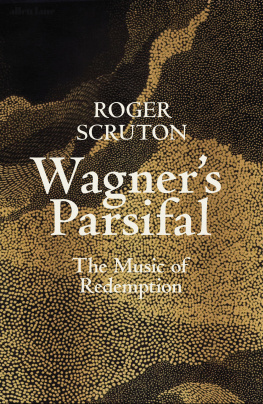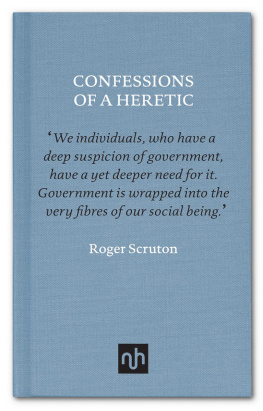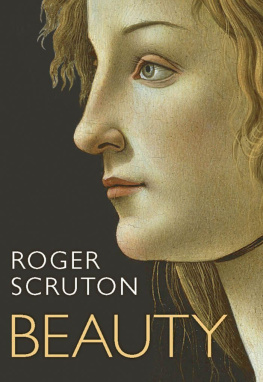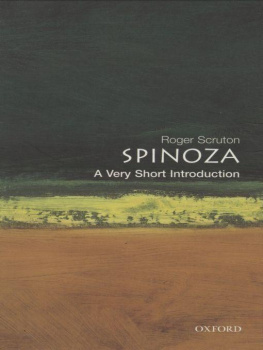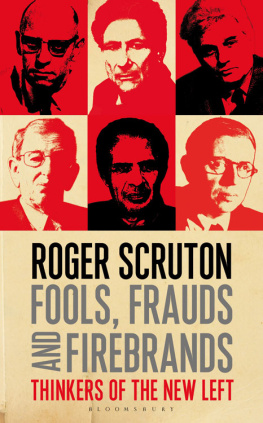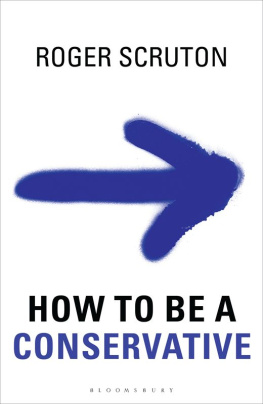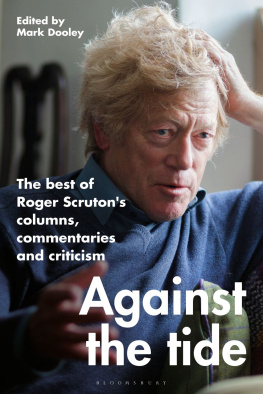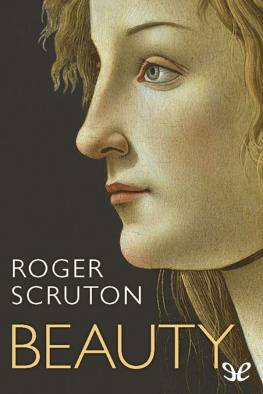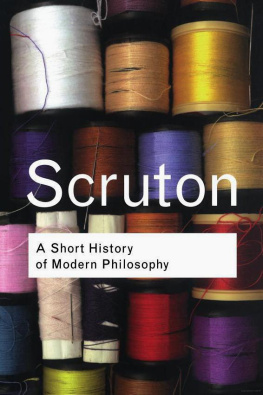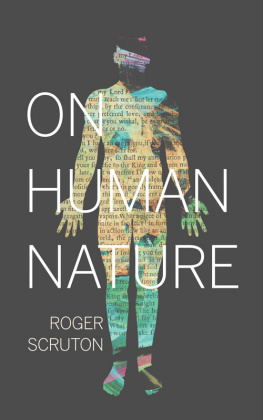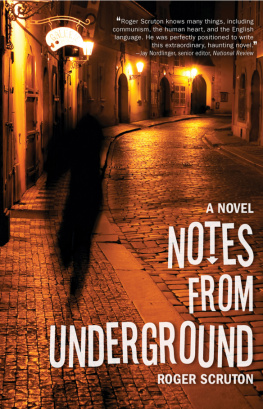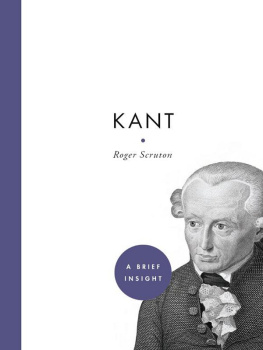
Discover books by Roger Scruton published by Bloomsbury Reader at
www.bloomsbury.com/RogerScruton
A Political Philosophy
Animal Rights and Wrongs
Gentle Regrets
I Drink Therefore I Am
Modern Philosophy: An Introduction and Survey
Sexual Desire
The Face of God
Thinkers of the New Left
Understanding Music
West and the Rest
Xianthippic Dialogues
Roger Scruton was born in 1944. He is a conservative English philosopher and writer, and author of over 30 books, including several novels and two operas.
Scruton was a lecturer and professor of aesthetics at Birkbeck College, London, from 1971 to 1992. In 1982 he helped found The Salisbury Review, a conservative political journal, which he edited for 18 years. Since 1992 he has held part-time positions at Boston University, the American Enterprise Institute in Washington, D.C., and the University of St Andrews. He also founded the Claridge Press in 1987, and sits on the editorial board of the British Journal of Aesthetics. He serves in addition as a member of the International Advisory Board of the Center for European Renewal.
SEXUAL DESIRE
A Philosophical Investigation
Roger Scruton

For copyright reasons, any images not belonging to the original author have been
removed from this book. The text has not been changed, and may still contain
references to missing images.
This electronic edition published in 2012 by Bloomsbury Reader
Bloomsbury Reader is a division of Bloomsbury Publishing Plc, 50 Bedford Square,
London WC1B 3DP
First published in Great Britain 1986 by Continuum Books
Copyright 1986 Roger Scruton
All rights reserved
You may not copy, distribute, transmit, reproduce or otherwise
make available this publication (or any part of it) in any form, or by any means
(including without limitation electronic, digital, optical, mechanical, photocopying,
printing, recording or otherwise), without the prior written permission of the
publisher. Any person who does any unauthorised act in relation to this publication
may be liable to criminal prosecution and civil claims for damages.
The moral right of the author is asserted.
eISBN: 9781448210435
Visit www.bloomsburyreader.com to find out more about our authors and their books
You will find extracts, author interviews, author events and you can sign up for
newsletters to be the first to hear about our latest releases and special offers.
Contents
The subject of sexual desire has been largely ignored by modern philosophy, and the biographies of the great modern philosophers suggest that they have tended to avoid the experience of desire as scrupulously as they have avoided its analysis. I leave it to others to offer theories as to why this is so. But the subject requires that I make a general remark concerning the trouble that philosophy encounters when it enters this domain.
Until the late nineteenth century it was almost impossible to discuss sexual desire, except as part of erotic love, and even then convention required that the peculiarities of desire remain unmentioned. This deliberate neglect also damaged the discussion of erotic love, which was made to appear yet more mysterious than it is, precisely because it had been deprived of its principal motive. When the interdiction was finally lifted by such writers as Krafft-Ebing, Fr and Havelock Ellis it was by virtue of an allegedly scientific approach to a widespread natural phenomenon.
Such was the prestige of science that any investigation conducted in its name could call upon powerful currents of social approval, which were sufficient to overcome the otherwise crippling reluctance to face the realities of sexual experience. However, it was precisely this dependence upon the prestige of science that led to the continued neglect of the subject. It became necessary to assume that sexual conduct is an aspect of mans animal condition an instinct whose expression exhibits the undiscovered laws of a complex biological process. But, as I argue in the following pages, no biological taxonomy could capture the lineaments of sexual desire. Desire is indeed a natural phenomenon, but it is one that lies beyond the reach of any natural science of man.
By the time that Freud had introduced his shocking revelations disguised once again as neutral, scientific truths about a universal impulse the language had been settled in which the details of human sexuality are now habitually presented. Freud described the aim of sexual desire as:
union of the genitals in the act known as copulation, which leads to a release of the sexual tension and a temporary extinction of the sexual instinct a satisfaction analogous to the sating of hunger.
Such language which expresses a certain hatred of the sexual act and all that pertains to it cannot capture what is distinctive in sexual experience. Its universal adoption by sexologists has led, however, to a remarkable science, which purports to explain that which it has no language to describe. The Kinsey Report, like the pseudo-scientific literature which has followed it, merely continues, in more vulgar and more spirited form, the moralising enterprise of Krafft-Ebing: the enterprise of confronting our moral sentiments with an allegedly scientific description of the facts which threaten them. The final outcome has been the establishment of the sexologists report, as a new literary genre. The style is exemplified by the Masters and Johnson Report, with its repeated references to the effective functioning, adequacy and frequency of sexual performance, and its pseudo-experimental approach to matters which we can see in neutral terms only by misperceiving them: Subject C has vocalised a desire to return to the program accompanied by his wife as a contributing family unit. The effect of this demystification of the sexual impulse has been the rise of novel and unprecedented superstitions, and the growth of a new kind of pseudo-scientific mystery which it is one of the aims of this book to dispel.
Only occasionally has a writer addressed himself to the crucial question which this scientific literature has contrived to ignore: the question of what a person experiences when he desires another. Desire is identical neither with the instinct which is expressed in it nor with the love which fulfils it. It is, I shall argue, a distinctively human phenomenon, and one that urges on us precisely that restricting sense of decency which once forbade its discussion. In this book I shall present a defence of decency; but in doing so I illustrate the truth of Bernard Shaws remark, that it is impossible to explain decency without being indecent. I only hope that the benefit, in terms of moral understanding, will outweigh the moral cost.
Earlier versions of the text were read by Joanna North, John Casey, Bill Newton-Smith, Robert Grant, David Levy and Sally Shreir, and I am greatly indebted to all of them for their many criticisms and suggestions. I am particularly grateful to Ian McFetridge, whose painstaking examination of the first draft provided the indispensable support without which this book would not have been finished in its present form. Thanks to his generosity, broad-mindedness and philosophical penetration, this work has been saved from many errors and obscurities, and I only hope that he will not be too distressed by those that remain.
Next page

